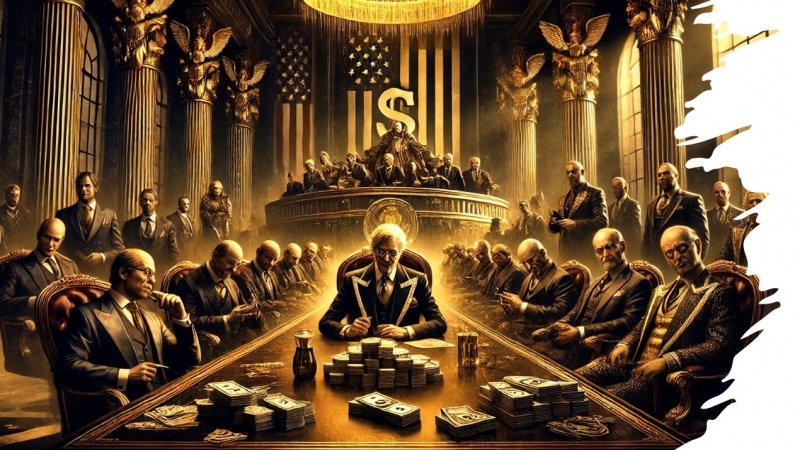by Editor (Editorials, Crescent International Vol. 38, No. 1, Rabi' al-Awwal, 1430)
Even while the economic tsunami hit the US, George Bush insisted that economic fundamentals were strong. When asked about the collapsing US economy at his last press conference as president, he replied, “I am not an economist; neither are you, by the way. I am an optimist and I believe the economy will eventually turn around.” He made these remarks despite his Treasury Secretary Henry Paulson and Chairman Federal Reserve Bank, Ben Bernanke, having told congressmen in a secret meeting on September 14, 2008 that if they did not approve the bank bailout package of $750 billion without preconditions, not only the US economy but the entire global economic system would collapse within days. Clearly, Bush could not have been unaware of the doomsday scenario painted by his top financial managers to Congress yet he continued to be in denial.
Bush’s presidency was not merely a bad dream; he has inflicted even bigger blows to the US than Osama bin Laden could ever have imagined. If still alive in some remote cave in Afghanistan, Osama must be chuckling at his good fortune. But the beating the US economy has taken is no laughing matter.
Over the past 22 months the shock has spread from the US housing market to banks, insurance companies, the auto industry and the manufacturing sector. Now the entire US economy and with it much of the Western world’s economies have ceased up. Everywhere good businesses are going bankrupt and jobs are being destroyed. Financial markets promised prosperity; instead they have brought misery. The $787 billion bailout package (not $750 billion) approved by the US congress for banks is already deemed insufficient. US President Barack Obama has mentioned multiple-trillion-dollar deficits for many years. There is even talk of creating a “bad bank” that will take all the toxic loans to free existing banks from debt. Free market capitalism has been turned on its head. While the going was good, bankers took credit for earning profits and refused to share the loot; in rough times, they want public money to bail them out. There are no bailouts for millions of workers out of jobs.
Obama’s director of national intelligence, Dennis Blair, testifying before the Senate Intelligence Committee, warned on February 12 that the deepening economic crisis posed perhaps the gravest threat to US stability and national security. So the world’s most dangerous terrorists reside on Wall Street, not in some cave in Afghanistan or in Pakistan’s tribal belt! The UN International Labor Organization estimates that some 50 million workers will lose their jobs worldwide this year. The collapse has already seen 3.6 million lost jobs in the US.
US economists predict that the Americans’ standard of living is undergoing a “permanent downward change” because Americans have lost $8 trillion due to declining home values, $10 trillion from weakened capital markets, and $14 trillion in consumer debt load in credit cards. The military surges in Iraq and Afghanistan are to be followed by even bigger surges in “unemployment” and business “bankruptcies”. This in turn will lead to serious social unrest amid fears that violence may escalate to a point where the army will have to be called out to impose order.
This is not mere conjecture. Chris Hedges, author and former correspondent of the New York Times, wrote on February 16 on the blog, Truthdig, “The specter of social unrest was raised at the US Army War College in November in a monograph titled ‘Known Unknowns: Unconventional “Strategic Shocks” in Defense Strategy Development.’ The military must be prepared, the document warned, for a ‘violent, strategic dislocation inside the United States,’ which could be provoked by ‘unforeseen economic collapse,’ ‘purposeful domestic resistance,’ ‘pervasive public health emergencies’ or ‘loss of functioning political and legal order.’ The ‘widespread civil violence,’ the document said, ‘would force the defense establishment to reorient priorities in extremis to defend basic domestic order and human security.” The army’s document further warned that it might necessitate rapidly divesting “some or most external security commitments in order to address rapidly expanding human insecurity at home.” It then spelled out what measures would be required, “Under the most extreme circumstances, this might include use of military force against hostile groups inside the United States” with the Pentagon taking direct control. In plain language, this means, martial law.
So the terrorists at Wall Street have not only wrecked the US economy, they have also created conditions under which martial law may be imposed to keep the hungry masses in check. As the Princeton professor Paul Krugman, winner of the Nobel prize in economics for 2008, wrote in his column in the New York Times on February 16, “So now we’re in trouble — deeper trouble, I think, than most people realize even now. For this is a broad-based mess. Everyone talks about the problems of the banks, which are indeed in even worse shape than the rest of the system. But the banks aren’t the only players with too much debt and too few assets; the same description applies to the private sector as a whole.” But do not expect any B-52 bombers to drop 1000-pound daisy cutters on Wall Street. Instead, the angry masses will face army bullets for demanding bread.
If the Iraqis and the Afghans can read English, they should know that US military adventures in their countries are unsustainable in the long term and that it would be forced to rush troops home to confront the mobs at the gate rather than worry about “troublemakers” in distant parts of the world. They need not completely defeat the Americans in battle — no Saigon moment may be witnessed in Baghdad or Kabul — but American soldiers will leave Iraq and Afghanistan sooner rather than later. The Wall Street gangsters and terrorists have arranged their trip home.
There is a positive side to capitalism after all.


